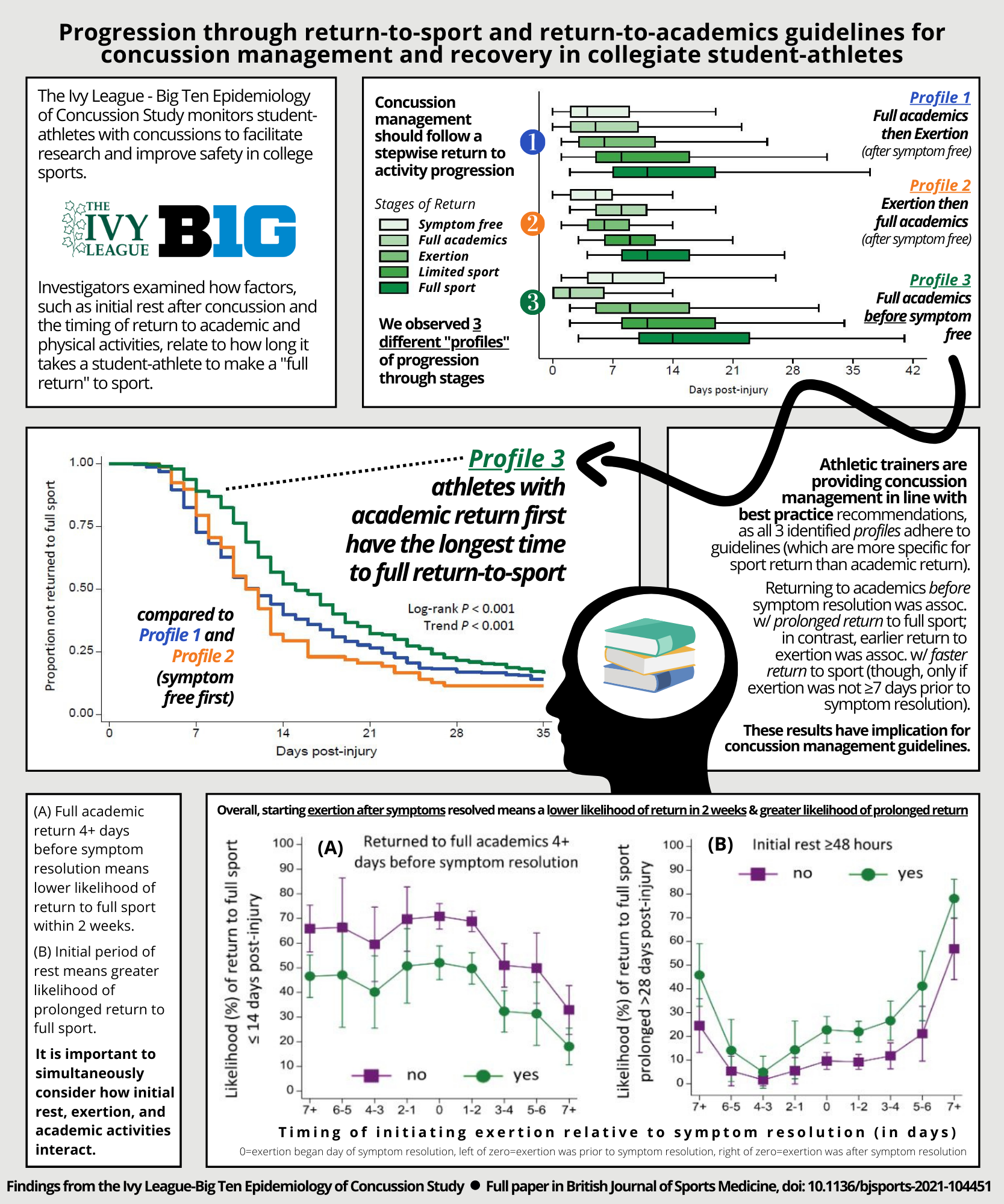Why is this study important?
In the not so distant past, we treated athletes with concussion by having them rest as much as possible for as long as necessary. Over the past 10 years, it has become increasingly clear that this was misguided. Athletes who start exercising about 48 hours after their concussion seem to do better and recover more quickly. There is guidance for clinicians to follow a stepwise progression while returning athletes to athletic-related activities; however, where the timing of return to the classroom fits into the progression and if early academic return influences time to return to full sport is less clear. There is some evidence that returning to the classroom and normal daily activities early decreases the risk of post-concussion syndrome, but it is unclear whether returning to full academics earlier may prolong symptoms or delay return to play.
How did the study go about this?
To examine the questions surrounding the sequence of return-to-learn and return-to-play, our prospective cohort study (following athletes after sustaining a sport-related concussion) determined the time it took to progress through return-to-activity milestones after the injury. We used a large multi-site surveillance system to observe activity milestones in over 1,700 contact sport athletes. The milestones reflect stages of return including symptom resolution, return-to-academics, return-to-exertion, and return-to-play (limited play then full play). Athletes were not randomized to groups, as their progressions occurred according to clinical practice. With these observational data, we tested if the timing of the progression influenced the time to return to full sport.
What did the study find? 
For over half of athletes (51.9%), academic return occurred before symptom resolution; and exertion activities (66.8%), limited play (92.1%), and full play (97.0%) occurred after symptom resolution. We first observed that athletes who returned to full academics as the first stage of their progression took the longest to return to full sport. Second, we observed the quickest return to full sport in athletes who restarted exertion activities on the same day their symptoms resolved, as well as athletes who returned to academics on the same day of symptom resolution. We examined factors related to the chances of returning to sport within 14 days or experiencing prolonged recovery, longer than 28 days. We found a lower likelihood of full sport within 14 days for athletes that (1.) started exertion more days after symptom resolution, (2.) had an initial period (24-48 hours) of rest, or (3.) returned to academics long before symptom resolution (4+ days). We found a higher likelihood of prolonged return to full sport in athletes that (1.) started exertion too soon (+7 days) before symptom resolution or started exertion too long (3+ days) after symptom resolution, (2.) had initial rest of 48 hours or more, or (3.) returned to academics before their symptoms resolved.
What are the key take-home points?
Early exercise is an increasingly popular component of concussion rehabilitation; this study offers evidence that starting exertion prior to symptom resolution is not harmful, as it did not decrease the likelihood to return to full play ≤14 days. The same may not apply to early return to the classroom, as it was associated with prolonged return to full sport in this study. Some students experience significant stress related to delayed return to school, even when receiving academic accommodations, which may explain why early return occurs and is an important consideration during concussion management. However, motivations for returning to school within student-athlete populations may vary considerably. As much as possible and practical, clinicians should apply more thought to the timing of academic return (including student-athlete concerns) during concussion management decisions, which may include appropriate delays until full symptom resolution.
Authors and Affiliations:
Abigail Bretzin, PhD, ATC; Carly Day, MD; Andy Peterson, MD, MSPH for the Ivy League-Big Ten Epidemiology of Concussion Investigators